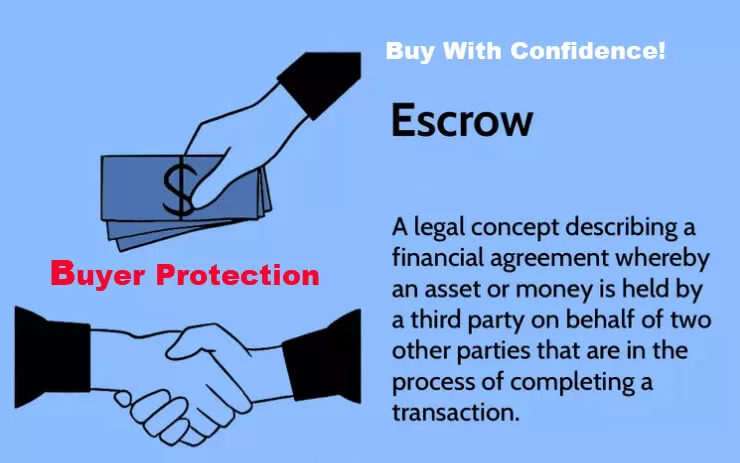
Buying a domain name through escrow is recommended. In the following paragraphs, we’ll explain why. In the conclusion, we’ll reiterate that regardless of the trust factor, in any transaction where the dollar amount is significant, escrow is recommended. This includes buying a domain name through escrow.
Escrow services play an essential role in the buying and selling of domain names. Escrow services are not limited by dollar amount as to when they ought to be used. The value of the transaction is only one component of the sale. The other key element is the people or entities.
For this discussion on domain name sales, the significance of escrow is that it eliminates any doubt that the buyer will receive the domain name purchased prior to the seller receiving any funds.
In more formal terms, escrow is a financial process used when two parties take part in a transaction and there is uncertainty about the fulfillment of their obligations.
Related to domain name sales, examples of situations that may use escrow include the purchase and sale of a domain name and the purchase of a domain name including monetized website.
Outside of the realm of the internet, other examples would include banking, intellectual property, real estate, mergers and acquisitions, law, and more.
Understanding that an escrow account is a contractual arrangement between a buyer and a seller, there needs to be someone to oversee the transaction who is not a party to the business taking place. That person is an escrow agent.
An escrow agent is a neutral third party who receives and disburses funds for the transacting parties. The transacting parties are the buyer and seller. These could be individuals, a corporation, or any combination of people including government.
Most common examples of escrow are in the buying and selling of real estate. Typically, a selling agent opens an escrow account through a title company. This is done once you and the seller agree on a home price and sign a purchase agreement.
When purchasing a domain name, the escrow process is similar. You commit to purchase a domain name at an agreed upon price. The seller commits to transfer the domain name to you for that agreed upon price. The escrow agent accepts your payment in trust and only releases it to the seller when confirmation is received that the domain name you purchased is in your control.
SELLER
The benefit to the seller is that they are assured of payment once their obligation of releasing and transferring the domain name as instructed is completed.
BUYER
The benefit to the buyer is that the agent only releases the funds to the seller upon the complete fulfillment of the domain name transfer process to the buyer
When buying a domain name, Escrow is a financial process used when two parties take part in a transaction and there is uncertainty about the fulfillment of their obligations.
Escrow is commonly understood in Real Estate as part of the home buying and selling process.
The same Escrow concept holds true for domain name sales where neither party know one another or have any recognizable relationship.
Through Escrow, you, the Buyer, places the agreed upon domain name purchase amount in trust with the Escrow agent.
Once completed, the Seller receives instructions to release the domain name to you, the Buyer.
When the Escrow agent is satisfied that the Seller has met their obligation as outlined in the purchase agreement, then and only then will the Escrow agent release the funds to the Seller.
Through the process of Escrow, both the Seller and Buyer are protected.
Escrow is a legal concept that describes a financial agreement whereby an asset or money is held by a third party on behalf of two other parties that are in the process of completing a transaction.
It is used to ensure that both parties meet their contractual obligations and to protect them from fraud or default.
For example, in a real estate transaction, the buyer may deposit money into an escrow account to show good faith and to secure the property until the closing date. The seller may also deposit the deed or other documents into the escrow account until they receive the full payment from the buyer.
An escrow agent acts as a custodian of the funds and documents and releases them only when all the conditions of the agreement are met by both parties.
The principle benefit of going through escrow is peace of mind. The buyer is assured of receiving what was purchased and the seller is assured of receiving the agreed upon sale price.
The amount of the transaction should not alone be the key deciding factor in determining whether to use escrow for a business transaction. In some instances, if the two parties have done business together and have a relationship of trust, escrow may not be needed at all. Overall, regardless of the amount, it is in the best interest of all parties, whether known to one another or not, to use escrow in any transaction of significance.